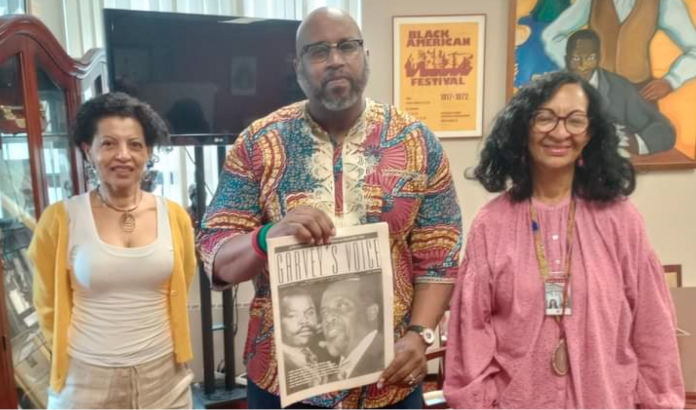“History should tell a people who they are, what they have been, what their full potential is, what they still must be, where they come from, where they are, and where that still must go…if it fails to do so, it is useless.” Dr. John Henrik Clarke
As we begin our walk into this new year, we continually are confronted with obstacles and barriers that keep us from knowing and loving our beautiful Black selves. The study of our history is essential to the cultural rehabilitation of the African mind.
For those who have been reading my articles in SCOOP, you are well aware that nothing is more important to me than the survival and development of Black people. If you have been reading my articles, you are aware that I work hard to help restore our people to their traditional greatness. If you read my articles, you are aware that I work to make the cultural unity, historical continuity, and economic cooperation of the African world a reality in my lifetime.
Being a student of Pan-African Nationalism for the last 35 years has given me the amazing opportunity to sit at the feet and learn from a very honorable group of Philadelphian historians, activists, and leaders in our struggle. Africans such as Dr. Ishakumusa Barashango, the Honorable Redman Battle, Dr. Edward Robinson, Henry D. Bernardo, Calvin Robinson, Queen Mother Akosua Sabree, Baba Johnny Gossett, Honorable Reginal Maddox, Del Jones, Hakim Duwad (Hakim’s Bookstore) and Muhammad Ahmad always informed me to be keenly aware of the local African cultural depositories that were available for learning and inspiration.
Currently, I serve the post of Head Archivist for the Universal Negro Improvement Association and African Communities League (UNIA-ACL) Thomas W. Harvey Memorial division #121. Our International Headquarters, which is open to the public, is currently being restored and is located at 1609-11 Cecil B. Moore Avenue. This building in itself is an African historical gem that is in plain sight. The government of the UNIA-ACL has owned this building since 1950, and it has served as an African Embassy to thousands of Black leaders and organizations that have educated and shown our people how to–collectively build confidence and self-reliance within our race. Officially representing the past works and deeds of Marcus Garvey within my post has given me the opportunity to travel to different libraries to officially donate certain copied UNIA-ACL newspapers and propaganda to be used as reference material by the surrounding Black communities. Copies of Garvey’s Voice from the past and present are some of the items that are proudly shared.
I recently visited the Blockson Afro-American Collection on the campus of Temple University. It was there, that I donated numerous copies of The Garvey’s voice newspaper. The Blockson Collection is one of the hidden treasures in plain sight that houses one of the world’s largest collections of African-American history, culture, and contributions.
Raised in Norristown, Pennsylvania, and told by a white teacher in fourth grade that Black people had no history worthy of study, Mr. Charles L. Blockson went on to become an authority on the Underground Railroad and the Great Migration in the early 1900s. His collection of nearly one million books, photographs, letters, posters, slave narratives, documents, transcripts, recorded speeches, sheet music, original phonograph recordings, and a phenomenal number of other artifacts can be read, studied, and even photographed by anyone who decides to experience and learn from this collection free of charge. Mr. Charles Blockson, who transitioned at the age of (89) on June 14, 2023, was also a very powerful and prolific author and scholar.
Ms. Diane Turner, the collection’s curator who officially accepted the Garvey’s Voices to be cataloged and displayed, said “When Mr. Blockson came, he brought 20,000 items to Temple, and today, we have over 700,000 items and growing.”
**********
Thank you for reading an excerpt of Khabyr Hadas’ article on scoopusamedia.com. To read more of the article, “Hidden in Plain Sight,” please subscribe to Scoop USA Media. Print subscriptions are $75.00 and online subscriptions (Print, Digital and Vizion) are $90. (52 weeks/1 year)


